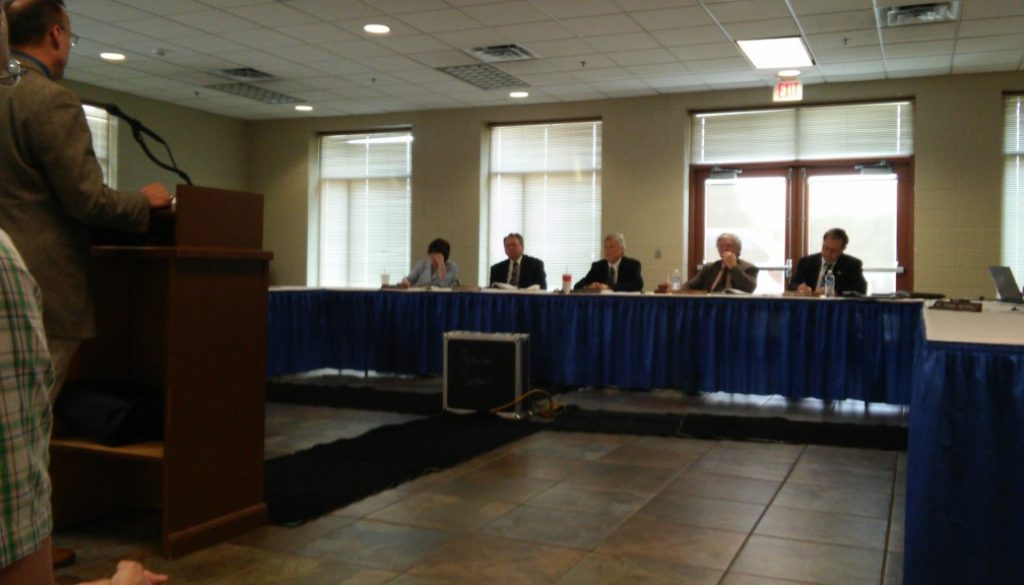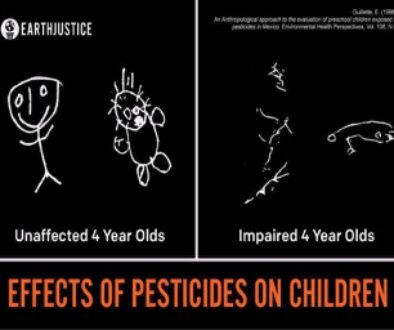NC Pesticide Board Meeting Notes – March 12, 2017 – Board chooses no action on neonics
In attendance: Dr. Allen Scarborough (Vice Chair and presiding); Dr. Colleen Hudak-Wise; Dr. Benson Kirkman; Mr. Shawn Harding; Mr. Don Rodgers; Mr. Jim Burnette (Secretary)
Not in attendance: Dr. Rick Langley (Chair)
Consider Board Minutes from December 12, 2016
Mr. Harding moved that the minutes be approved as is, which Dr. Kirkman seconding. Unanimously approved.
Inquiry into follow-up from Dr. Melissa Perry
Dr. Scarborough asked Mr. Burnette if there had been any follow-up from questions that he asked Dr. Perry after her presentation on the human health effects of neonics. Mr. Burnette replied that there had been none.
Consider Exemption Request from the Requirements of 02 NCAC 09L.1003(3)
Chris Elder of the Plant Industry Division of the North Carolina Department of Agriculture and Consumer Services (NCDA&CS) requests an exemption to dispense particles above the set threshold of 40ft because the Department dispenses mating disruption pheromones at 100ft to combat the gypsy moth.
Mr. Rodgers commented that the gypsy moth was expected to take over North Carolina, but through these efforts, that coverage has been limited.
Dr. Hudak-Wise made a motion to accept the request for exemption, Mr. Rodgers second the motion, and it was unanimously approved.
Consider Elimination of the NC WPS Designated Trainer Exam
Renee Woody of the NCDA&CS, Pesticide Division, requested elimination of the WPS Designated Trainer Exam do to the revised WPS requiring annual trainings. Ms. Woody said that up-to-date, EPA approved train-the-trainer materials are available on the Pesticide Education Research Collaborative (PERC) website that can meet the same requirements as the State’s exam. The State’s exam was not set in rule, but the Department was requesting consent to not offer the exam from the Board.
Dr. Kirkman made the motion to eliminate the WPS Designated Trainer Exam in North Carolina. Mr. Harding second the motion, and it was unanimously approved.
Pesticide Environmental Trust Fund, Request for Funding
Ms. Woody also put forth a request for funding from the Pesticide Environmental Trust Fund for the pesticide contain recycling program. Currently there are 67 counties across North Carolina that have active pesticide recycling programs. For 2016, 557,310 pounds of pesticide containers were recycled into agricultural drainage pipes.
Ms. Woody requested $60,000 for the program that would be transferred in county grants to run their programs ($51,875), promotional materials ($5000), and for the John L. Smith Award ($3,125).
Dr. Kirkman made a motion to accept the request, and Dr. Hudak-Wise second the motion. The motion was unanimously approved.
Settlement Agreements
N.C. Department of Agriculture and Consumer Service, Structural Pest Control and Pesticide Division v.
For a full description of the Settlement Agreements, please click the following link: March 2017 Board Settlement Agreements
Presentation from Dr. Jay Overmyer, Syngenta, titled “Neonicotinoid Insecticides: Focus on Syngenta Studies with Thiamethoxam”
Dr. Jay Overmyer presented to the Board on the work that Syngenta is doing with neonicotinoid insecticides, honeybee health, and the effects of Syngenta’s product, thiamethoxam, on honeybees, aquatic species, and birds. Dr. Overmyer highlighted the importance of this class of insecticides to growers and the work that Syngenta is doing to replicate full field studies with honeybees and their neonicotinoid products. Dr. Overmyer also went on to talk about the multiple factors that affect honeybee health, with pesticides being one of them.
The majority of the presentation concentrated on the field studies that Syngenta conducted between 2014 and 2015 near Mebane, North Carolina. The studies showed that there was a decrease in pollen storage leading to less brood and lower adult population numbers. However, Syngenta was not allowed by the EPA to feed the hives over the winter season, so there were losses across the study, including the control hives, leading to less than significant results. The EPA ordered the study to be supplementary and for Syngenta to redo the full field study, which they are in the process of doing.
Dr. Overmyer also concluded that the risk of thiamethoxam to honeybees and birds is relatively minimal, and that although aquatic insects are sensitive to neonicotinoids, the exposure rates are usually not in concentrations that would have a great impact on them.
Presentation from Dr. Jill Sidebottom, NC Agricultural Extension, titled “Neonics and Mountain Conifers”
Dr. Jill Sidebottom presented to the Board about how nenoicotinoids are being used to fight the Hemlock woolly adelgid (HWA) in Western North Carolina. Right now, imidacloprid and dinotefuran are primarily being used for control. Imidacloprid is being used as a foliar application, whereas dinotefuran is primarily used as a root treatment. Dr. Sidebottom also expressed that there is concern amongst the general public and beekeepers in Western NC about the use of neonicotinoid products. Dr. Sidebottom noted that the Agriculture Extension office promotes Integrated Pest Management through ground covers at Christmas tree operations to reduce pesticide inputs and provide habitat for beneficial insects, like pollinators.
Dr. Sidebottom also discussed the more recent threats from Elongate hemlock scale (EHS), which was introduced from Asia in 1908 and creates an armored scale that buries itself under the wax of the needle. This has created an additional problem for Agricultural Extension, which has added to the problems that still exist after 60 years of research and 23 chemicals that have been used to try to treat these various pests. EHS has caused problems between North Carolina Department of Agriculture and Florida’s Department of Agriculture because Florida purchases over a million trees from North Carolina and EHS could potentially harm two of Florida’s native conifers (torreya tree and the Florida yew). Dr. Sidebottom concluded that EHS is more of a regulatory problem than a destructive pest, but that she is trying different chemical and non-chemical approaches to managing EHS.
NC Pesticide Board chooses no regulatory action on neonics
After the completion of Dr. Sidebottom’s presentation, Mr. Harding moved that the Board take no action on the neonicotinoid class of chemicals at this time. Dr. Kirkman proposed an education campaign as opposed to “no action”, with the Department of Agriculture assisting to make sure that neonicotinoids are not overused. Dr. Hudak-Wise then proposed as a clarifying point that the Board takes no regulatory action. Mr. Harding said that was fine as an amendment, but was supportive of educational efforts. Mr. Rodgers noted that the EPA still is conducting reviews and that that information should be provided to the Board upon completion. Mr. Harding agreed and felt that there was no “need to get out ahead of the EPA” on the subject, which is suppose to have a full assessments of nenoicotinoids out by the end of 2017. Dr. Hudak-Wise suggested to amend the motion to be “no regulatory action, but would like staff to consider educational opportunities.” Mr. Rodgers second the motion. Dr. Hudak-Wise suggested, “if something were to come up pertinent to this information, then we [the Board] would reexamine.” Mr. Harding agreed and also stated though that neonicotinoids are “an important class of chemistry for their growers.” Dr. Kirkman said that he felt that this issue would not be going away and as researchers found out more information that there was potential for the Board to look at it again. The final motion was unanimously approved.


